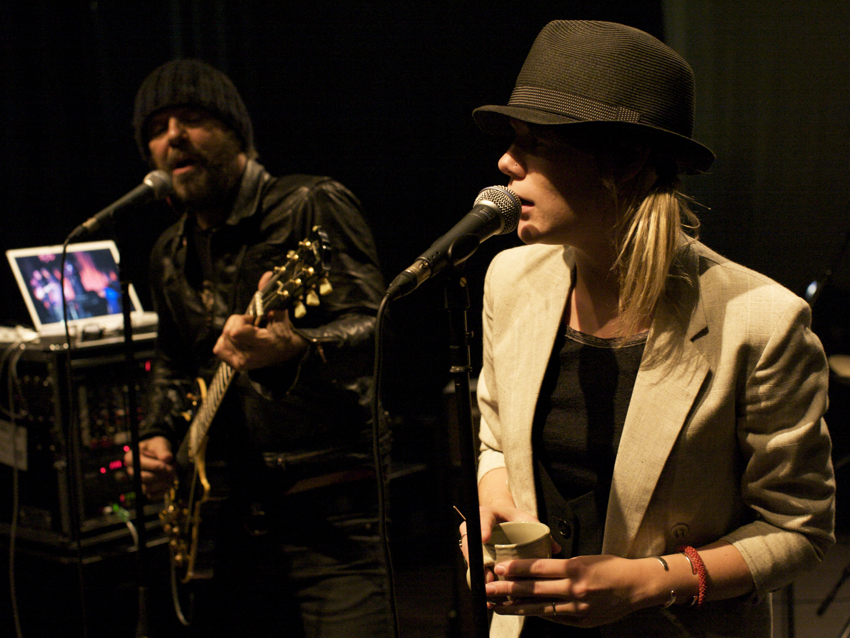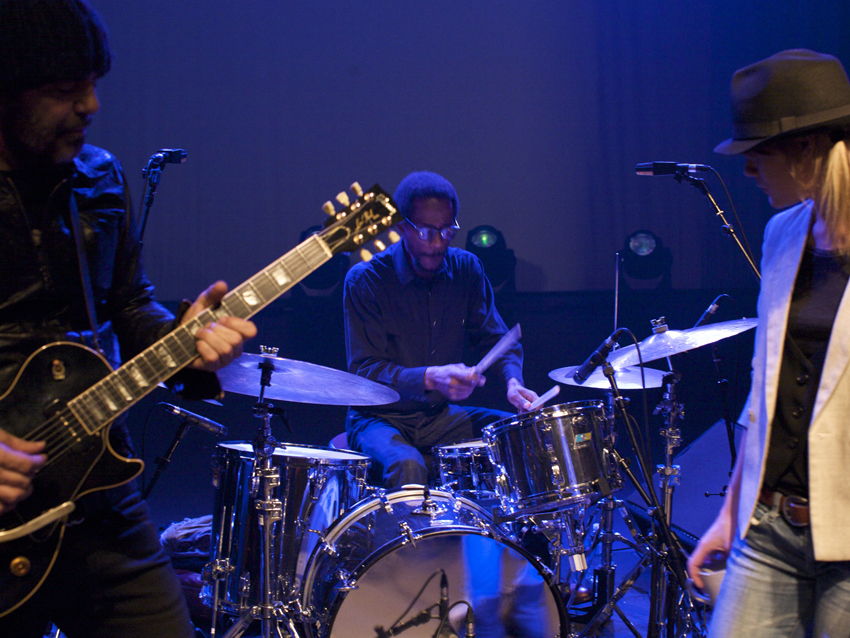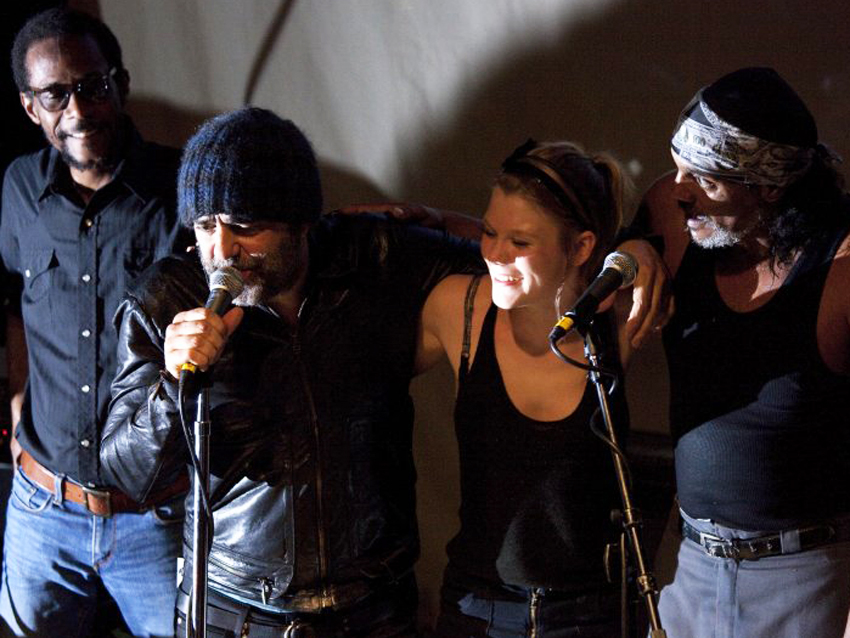Daniel Lanois is a happy man. The legendary producer, who has made his mark working with artists such as U2, Bob Dylan, Peter Gabriel, Neil Young and The Neville Brothers, among others, is primed and ready to hit the road with his own band, the all-new Back Dub. But the real reason for Lanois' joy runs much deeper than that - he's just thrilled to be doing anything at all.
"Thank God I'm alive," he says, referring to the serious motorcycle accident he suffered earlier this year, one which landed him in intensive care for several weeks. "It was pretty bad. I broke something like six ribs. But here I am, walking around and swimming every day. Still, it was a terrible thing to go through. For a guy who'd never been in the hospital before, to be in intensive care for all that time - not a lot of fun. I think a lot of people must have been praying for me."
That they were. And now those folks will be amply rewarded with the sounds of Black Dub. Normally a behind-the-scenes kind of guy, Lanois is stepping out as guitarist and co-vocalist with the band, which also includes 23-year-old lead singer Trixie Whitley (daughter of the late blues artist Chris Whitley), along with bassist Daryl Johnson and drummer Brian Blade.
Their just-released, self-titled album, recorded at Lanois' expansive Los Angeles home, is brimming with soulful, bluesy and ethereal numbers (make no mistake: Whitley, despite her youth, is already a vocalist of breathtaking range and depth), such as the haunting I Believe In You and Caanan. And on two of the record's instrumentals, Sirens and Slow Baby, Lanois gets to show off his impressive studio wizardy, not to mention his prowess on the guitar (check him out, blazing away, in the exclusive video above).
Lanois recently sat down with MusicRadar to discuss the formation of Black Dub and the recording of their debut album. In addition, we also talked guitar (does he influence The Edge or the other way around?) and asked him what he's learned from being shoulder-to-shoulder with the iconic producer Brian Eno.

Daniel Lanois trades vocals with Trixie Whitley. © Jive Records
Being a successful producer all these years, were you looking to do something different, as in forming a band?
Want all the hottest music and gear news, reviews, deals, features and more, direct to your inbox? Sign up here.
"I wasn't looking to form a band. I was doing a two-piece show in Belgium - Brian Blade was playing drums with me - and I remember it as being particularly good and fiery. After we played, the promoter told me that a couple of girls wanted to say hi backstage. As it turned out, they were the Whitleys, Chris Whitley's widow, Helene, and her daughter, Trixie.
"I hadn't seen Trixie since she was two years old. I couldn't believe she was all grown up. She told me she was singing and playing drums, which I thought was great. She gave me a CD she had made, and I listened to it and went, 'Whoa! There's something going on here in the vocal department.' So I said, 'Let's see if we can do something together.' With Brian Blade on drums and Daryl Johnson on bass, we cut a couple of tracks, and it worked out very well right away."
"We did a song of hers called I'd Rather Go Blind in Boston, and then we recorded a song of mine called I Believe In You in Toronto. Both were first takes, and I was really pleased. I could tell something was there. I like the idea of putting interesting people together, so before you knew it, I had this little group going on. Like I said, I wasn't looking to put a band together, but when you find yourself working with a wonderful bunch of people, sometimes you have to go with what's in front of you."
As you know, the word 'organic' gets tossed around so much in describing music. That said, if I had to pick a word to convey the feeling of your record, 'organic' would certainly apply.
"Yeah, that's OK. I think we can put the word 'organic' to a lot of our stuff. The spectrum is very wide to how we recorded. Some things were live right off the floor, while others were complete studio creations. There's a song called Slow Baby that I really labored over. It's not a live performance at all; it was analyzed and pruned, with lots of 'best ofs' thrown in. That displays the more studio side of what I do.
"Then there's a piece called Sirens, which is a complete guitar whack-job. It's me doing pretty much a one-person performance, and what I do is, I build and build and create this monster. [laughs] The hard part to something like that is, at some point I have to go in and take a 20-minute performance and turn it into the most significant two minutes. That's when I get into my dubs and all kinds of echoes. It becomes a tapestry of sound."
It's interesting that the band was put together rather quickly. You guys sound like you've played together for years.
"In a way, we have. I've worked with Brian Blade and Daryl Johnson for quite some time. Trixie's the new person on the scene here. It's a great mix."
Now, aside from the songs you already mentioned, how did you go about composing new material?
"They were written pretty quickly, in something of the classic songwriting manner. There's a song called Surely that I wrote with my co-writing partner, William Blake. I took a few lines from William, and I sort of ran with it. Trixie heard it and really liked it - 'Oh, I want to sing that!' [laughs] That one came together real quick, and we knocked it out in the foyer of my house."
I like how you refer to it as a 'house.' It's quite grand!
[laughs] "Houses are good. Nice places to make records in."

Lanois records with drummer Brian Blade and Trixie Whitley. © Jive Records
This isn't the first time you've recorded somewhere other than a conventional studio. Do you find working in unorthodox locales particularly inspiring?
"It's nice to build a setup specific to a project, which is the opposite to working in a conventional recording studio where other albums have happened. Not that I don't like studios - I like being in a studio where Jimi Hendrix has been in. [laughs] But yeah, it's fun to set up a tent and watch the monsoons come your way."
How soon after 'setting up your tent,' as it were, did you say to yourself, "Hey, this is a band. We can make music together"?
"It didn't take long. Trixie, she's…she's got a lot going on. A very multi-dimensional artist. There was a lot of bravado to her, that voice-of-a-generation thing. I just knew it would be cool to combine these forces. Sometimes it gets intense - she's intense, I'm intense. I just took a gamble on these radical characters, and it worked out."
You and Trixie sing beautifully together. When did you realize that your voices could blend so well?
"A lot of the confidence came from doing a song called Silverado. We do many versions of that - sometimes we do it as a duo. I think our phrasing together is good. And then, Daryl Johnson has a beautiful falsetto. You know, I came up in an arena of harmony singing. Trixie's new to all of this, but she's really good at picking parts and understanding where she has to go as a lead singer."
She seems fully formed as an artist, way beyond her years. Her poise, her phrasing...
"She's led a long life in her time. You know, she lost her father at a young age, and that makes you grow up pretty fast. More than that, as a teenager, I think she had to be resourceful just to survive."
How long did it take to actually record the album?
"In some ways, it took a while because I had some of these things in the can for a while. The contradiction to that is, when we huddled together in the front room and played the songs live and filmed ourselves, we just knocked 'em out in one take.
"There was no monkey business. No separation, no overdubs, nothing. I thought to myself, What's all the fuss? Why have you been working on this for so long? You could've just gotten everybody together in a room and knocked it all out in one take! So I'm really glad I did that. Raw takes, man. It helped that we were nicely balanced acoustically in the room. You only need baffles when somebody's playing louder than somebody else."

Flanked by Black Dub members Brian Blade, Trixie Whitley and Daryl Johnson, Lanois practices his Grammy acceptance speech. © Jive Records
Let's talk about your guitar playing. You're using a lot of Les Pauls, right?
"Yeah, through a Vox AC30. I have a 1953 Goldtop with a Tune-o-matic bridge and a Bigsby whammy. I was going to put a humbucker in the front position, but I was talked out of it. The guy who was making the changes to the guitar told me to stay with the P-90s.
"The Vox AC30 is one of those copper panel ones - I think it's from 1963. I have a few of them. But the best one I call the 'Dark Animal.' I only use the normal channel; I never use the bright channel. Sometimes I use a Korg SDD-3000 in the chain. I use it as a delay and a VCO device."
You get a lot of chimey tones from the Les Paul. Style-wise, I notice you do a lot of fingerpicking.
"It's all fingerpicking. I never use a flat pick. It's all thumb and index finger. But I do smack the strings with my fingernails sometimes."
In the song Ring The Alarm, you guitar sound recalls both Neil Young and The Edge. Having worked with The Edge for so long, has he influenced you at all?
"Well, that's probably the power of osmosis. You hang around people and you pick up some tips and habits. It's like a two-way street. The Edge has obviously built a sound for himself with his echo machines. It all stared out with a Memory Man. It wasn't that complex for him; he just built into that triplet echo. So he's responsible for his own sound, of course. Any kind of crossing I've had with The Edge...I might have brought a little something to his way of looking at things. Like on the song One, there's that little hammer-on part [he sings the guitar line]. That's a part that I played. It has nothing to do with the echo."
Black Dub is a pretty tight group. I assume you like not having to deal with a lot of instruments and musicians.
"Playing in a trio is great because you play no filler. Trixie does play some, too, of course. But in a band this tight, every note is supposed to serve a support role. I love to get down to the bones of your parts."
You've worked extensively with Brian Eno over the years. What's the biggest thing he's taught you, and in turn, what do you feel you might have taught him?
[laughs] "Brian is a master of the pen. He's a master of keeping notes on particular sounds and things we've done. If somebody can't remember what we did three months ago on a recording, he'll know because he has it all written down. He's a great low-baggage, high-mileage artist. As for anything I might have brought to him, you'd have to ask him that one. [pauses] Maybe patience!" [laughs]
Going forward, do you see yourself doing more with Black Dub?
"I think we've just scratched the tip of the iceberg with Black Dub. I'm really looking forward to huddling up with everybody and making another record. It'll probably be more collaborative. We're going to do some shows and carry on through the new year. Then next summer we'll be playing more shows. There's a lot to do with this group."
Joe is a freelance journalist who has, over the past few decades, interviewed hundreds of guitarists for Guitar World, Guitar Player, MusicRadar and Classic Rock. He is also a former editor of Guitar World, contributing writer for Guitar Aficionado and VP of A&R for Island Records. He’s an enthusiastic guitarist, but he’s nowhere near the likes of the people he interviews. Surprisingly, his skills are more suited to the drums. If you need a drummer for your Beatles tribute band, look him up.
